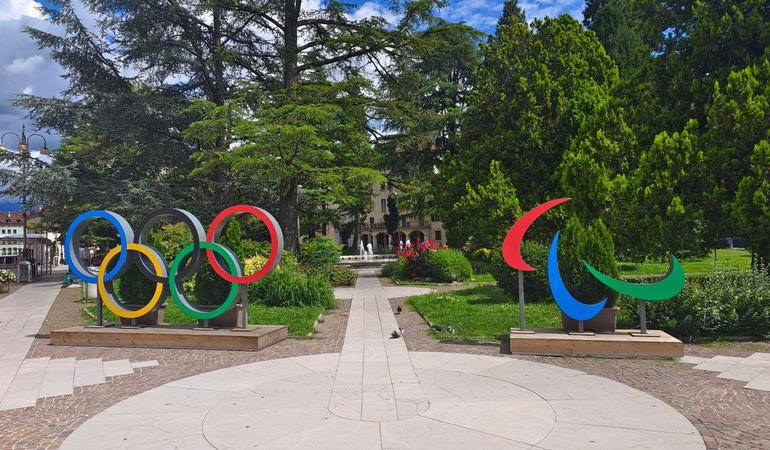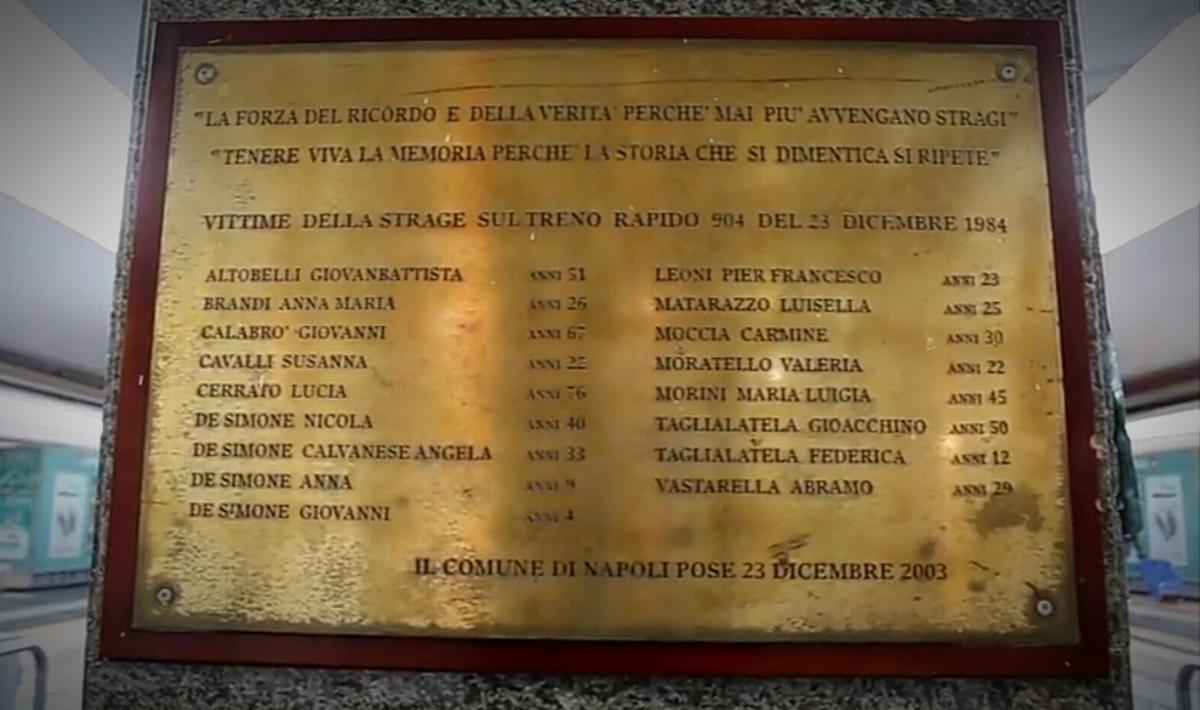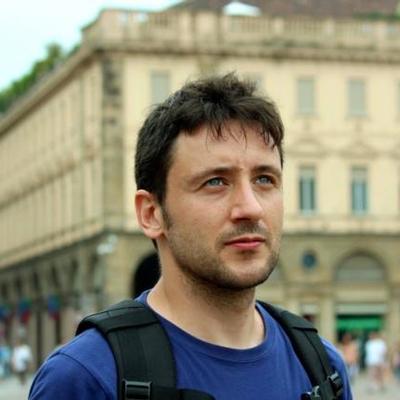
Milano-Cortina. Ecco come verranno spesi i 450 milioni di euro delle paralimpiadi



23 dicembre 2024
On 23 December, forty years ago, the Rapido 904 train, which left from Naples station and was bound for Milan, exploded as it passed through the large Apennine tunnel, halfway between Florence and Bologna. Sixteen people died in the attack, including three children aged 4, 9 and 12. Today, all that remains of the massacre is a faint memory. There is no crumpled piece of sheet metal kept in a glass case to show people, and not even a stopped clock at 7.15 p.m., the moment when the deflagration wiped out the entire second-class number nine carriage.
The same tunnel where the convoy blew up is a kind of non-place, making a commemoration on the spot impossible. And so every year, thanks to the efforts of a few, a ceremony in memory of the victims is organised at Naples station, even though the Neapolitan city has never had the emotional transport that is felt elsewhere for other commemorations.
Even historians struggle to place the massacre in a definite period. The attack took place when, by convention, the "Strategy of Tension" was considered to have ended - the last episode was the bomb that exploded at Bologna station on 2 August 1980 - and anticipated the Mafia massacre of the 1990s. It is an event in itself, a sort of hinge between two bloodstained seasons.
This vagueness, together with a certain desire to remove the event and cover up the identity of those responsible who remained anonymous, meant that the story remained suspended in time. And this forty years later still causes pain.
The Anti-Mafia Commission attempts to shed light on the killing of Paolo Borsellino
Historian Alexander Hobel, author together with Gianpaolo Iannicelli of the book La strage del treno 904. A contribution to the social sciences, knows the event inside out. In order to try to understand it, it is necessary to frame the historical moment, which was eventful and highly controversial.
'In 1984, the social and political context was very lively, the debate on the escalator (the mechanism for the automatic adjustment of the purchasing power of wages, ed.) was taking place, and after the death of Enrico Berlinguer, in the European elections, for the first and only time in a nationwide electoral round, the PCI had established itself as the leading party. Mafia boss Tommaso Buscetta had been extradited and his revelations to Giovanni Falcone would lead to the maxi-trial in Palermo, while judge Felice Casson was investigating the paramilitary organisation Gladio and the work of the parliamentary commission of enquiry into the P2 Masonic lodge, chaired by Tina Anselmi, was drawing to a close. In other words, what Francesco Biscione defines as 'the underworld of the Republic' was emerging and this new climate was alarming not only Cosa Nostra but also more or less obscure entities, the grey area of disturbing plots and relationships'.
In the trials for the Rapido 904 massacre, only two people were convicted: the Mafia boss Pippo Calò and his right-hand man in Rome Guido Cercola, who hanged himself in Sulmona prison in 2005. 'Calò's role is fundamental,' observes Hobel, 'because he was the glue between Cosa Nostra and the other powers. Certainly, he could not have started the attack without the backing of those deviated sectors of the services, of that underground to which he was linked'.
Among other things, the attack took place in the same place where, on the night between 3 and 4 August 1974, the Italicus train was blown up. This was not a coincidence, but rather a clear message addressed to the democratic forces that were trying, albeit with difficulty, to restore legality at several levels. 'The signal had to reach more recipients, it has more meanings and senses,' adds Hobel. 'We cannot be satisfied with the judicial truth, it is a duty to understand who was there besides Calò and Cercola'.
Then there is the absurd affair of the German bomb-maker Friedrich Schaudinn, who was in contact with Cercola and was in charge of producing the devices used in the bombing. Arrested after the investigation into the massacre, in 1988, before the first-degree trial opened, he managed to escape from house arrest and, thanks to the help of the Italian secret services, to expatriate to Germany, as he himself confessed in 1993 during a programme hosted by Michele Santoro. "Schaudinn is a high-level figure," explains Hobel, "he belonged to an international network and this element should give us pause for thought, because if the Mafia had acted alone, it would certainly have turned to its men.
The historical revisionism of Giorgia Meloni
The massacre of the Rapido 904 was underestimated and received little attention. 'Even the national construction of a memory has struggled to get off the ground,' the historian points out, 'just think that no high office of state has ever participated in the commemorations. Something new may emerge from the new investigations launched by the Florence Public Prosecutor's Office: the news, which arrived last February, has surprised and not a little.
Rosaria Manzo, daughter of a train driver who survived the attack and for some years now president of the Association of the families of the victims of the massacre on the Rapido 904 train, does not hide her astonishment. "We heard about it from the newspapers, now the hope is that after forty years someone will decide to name the names of those who organised the massacre: it seems that everyone knows them but no one has the courage to say them. Many family members are no longer with us and the lives of the survivors have been turned upside down, I think it is time to put an end to this story'.
In addition to 23 December, every year the names of the victims of the Rapido 904 are read out on 21 March, during the National Day of Remembrance and Commitment in Memory of the Victims of the Mafia, and on 9 May, Remembrance Day dedicated to the victims of terrorism.
'Perhaps this being on both sides risks coming to nothing,' observes Manzo, who then adds: 'Rapido 904 was dismantled in general silence, as if they wanted to erase its memory. The government has never sent anyone to the commemoration in Naples, not even a minister in all these years. For the ceremony on 23 December, if until two years ago the municipality was paying the costs of setting up the stage inside the station, now even those are borne by us. Apart from the Polis foundation, no one is making a contribution, I don't think we need to add anything else'.
While waiting for the message signed by the President of the Republic Sergio Mattarella - 'I hope that to receive the telegram a written request will not be necessary, as I was told a few years ago by the quirinal secretariat,' Manzo recalls sarcastically - the 23 December celebrations will open at 11 am with the commemoration at San Benedetto Val di Sambro (Emilia Romagna), the station closest to the site of the massacre.
At 12 noon, the ceremony will begin in Naples, with the reading of the victims' names starting at 12.55pm, the time when the train left. The same names will then be read out in Rome, Florence, Vernio, San Benedetto Val di Sambro (at 19.08, the time of the explosion), Bologna and Milan, where the passengers were headed to celebrate Christmas. Which for them never came.
La tua donazione ci servirà a mantenere il sito accessibile a tutti
Riformata. Così il governo vorrebbe la magistratura, ma l'obiettivo è solo limitarne il potere
La tua donazione ci servirà a mantenere il sito accessibile a tutti